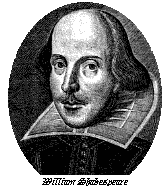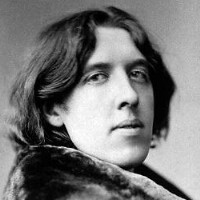


Wilde
| William Shakespeare |
Two from his earliest books (History in English Words, Poetic Diction) follow:
- There is an unobtrusiveness about Shakespeare's enormous influence on his native tongue which sometimes recalls the records of his private life. This is no doubt partly due to the very popularity of his plays, which has preserved the direct influence in every age. Where the word which he employs is a new one, it had usually become so common in the course of years that we find it hard to conceive of the time when it was not. Where it is a meaning or a shade of meaning which he has added, as likely as not that very shade is the one most familiar to our own childhood before we had ever read a line of his poetry. . . . The influence of such a mind on the language in which it expresses itself can only be compared to the effect of high temperatures on solid matter. As imagination bodies forth the forms of things unknown, each molecule of suggestiveness contained in each word gains mysterious freedom from its neighbors; the old images move to and fro distinctly in the listener's fancy, and when the sound had died away, not merely the shape, but what seemed to be the very substance of the word has been readjusted. (HEW 148-49)
- Oscar Wilde's mot--that men are made by books rather than books by men--was certainly not nonsense; there is a very real sense, humiliating it as it may seem, in which what we generally venture to call our feelings are really Shakespeare's "meaning." (PD 137)
| See in particular "Experiment" (HEW 139-55). |